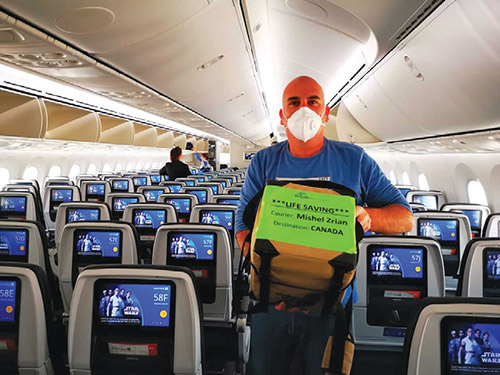
(Courtesy of Ezer Mizion) Did you ever land late at night at an airport? By the time you deplane, there is only a handful of people around. It’s eerie. But you comfort yourself with the thought that in a few moments you’ll be out and speeding along towards home. But what if you won’t? What if you’ll be spending the rest of the night there? Read on to meet a man who did this for 77 days!
Often a stem cell transplant is the only chance of survival for a cancer patient. Genetic matching between donor and recipient, crucial for success, can be a major hurdle when family members are not a match. With over 1 million registrants, the Ezer Mizion Bone Marrow Registry is highly successful in finding that elusive match, facilitating 30 to 40 stem cell transplants each month. But what if the donor is in Israel and the patient resides in England, South Africa or the United States? Over 60% of stem cells at Ezer Mizion’s International Jewish Bone Marrow Registry are normally transported by courier for life-saving transplants to 146 countries outside of Israel. How does Ezer Mizion manage this, what with the many COVID-19 restrictions?
“It’s been a struggle the entire time but at the back of our minds always is that the patient must receive this transplant or else he will die,” said Dr. Bracha Zisser, founder and director of Ezer Mizion’s bone marrow registry, the world’s largest Jewish bone marrow donor registry.
Mishel Zrian, one of Ezer Mizion’s couriers, redefined the word “dedication” when he found a creative solution to the problem. With a wife and two children in Israel, he has been literally living in airports for nearly three months! With a two-week quarantine upon returning to Israel after delivering life-saving stem cells to patients across the globe, one would think Mishel would simply give up and go home to his family while another volunteer flew around the planet. Mishel simply remains in Ben Gurion Airport until the next “little bag of life” is brought to him. He has been crisscrossing the world—from South America to the United States and 14 countries in Europe—without leaving the airport. “Chicken for breakfast and an apple for supper? At least I get to eat that day. Some days I don’t,” Mishel comments.
“I really miss my wife and kids but they’re cheering me on from afar. They know that a lot of people are going to be alive because our family made the right decision. It hasn’t been easy. We tend to take things like a washing machine for granted. Well, believe me, I’m going to appreciate it when this is over. A sink is just not the same. And my bed. Oh, how I miss my bed! The airport lounge is actually luxurious compared to a nighttime flight. I recently did six nighttime flights in a row. Often I’m the only passenger and then I land in a dark, empty airport. It’s depressing, to say the least. But then I remember what I’m doing this for. I’m saving lives!”
At first, foreign couriers who do not have an Israeli passport were denied entry into Israel, making it impossible for Ezer Mizion to rely on the delivery methods bone marrow registries use under normal circumstances. Israeli couriers were forced to wait a two-week isolation period following their return into Israel. Ezer Mizion kept on working on solutions for the rapidly changing regulations.
In one instance, Ezer Mizion used a courier to get stem cells, which are no longer viable 72 hours after collection or harvesting, to Turkey after which an emissary transported them to England and from there on to their final destination. Then, passenger flights departing from Israel were totally cancelled!
This represented a major new challenge for Ezer Mizion, the largest Jewish bone marrow registry in the world, since international protocols permit transport of stem cells only via a personal courier. How then has the organization managed to send life-saving stem cells to patients in 47 countries if there are no flights at all? Patients’ lives were and still are depending on receiving the new stem cells as a matter of extreme urgency.
Ezer Mizion found a novel solution to the challenge: cargo flights. A company was found that agreed to allow Mishel and other couriers on board their cargo flights. While not very comfortable, the couriers, knowing what is at stake, endured the hardship. This unprecedented solution lasted only about 10 days until Ezer Mizion finally reached an agreement with a cargo company where the pilots would take the stem cells and at their stopover in Belgium would transfer the stem cells to a courier who would take the package to its destination in Europe, the United States or anywhere else in the world.
“The stem cells can last for about 72 hours. Getting them to their destination is literally a matter of life and death. It hasn’t been easy but I’m thrilled to say that not once did we miss the deadline,” Zisser said.













